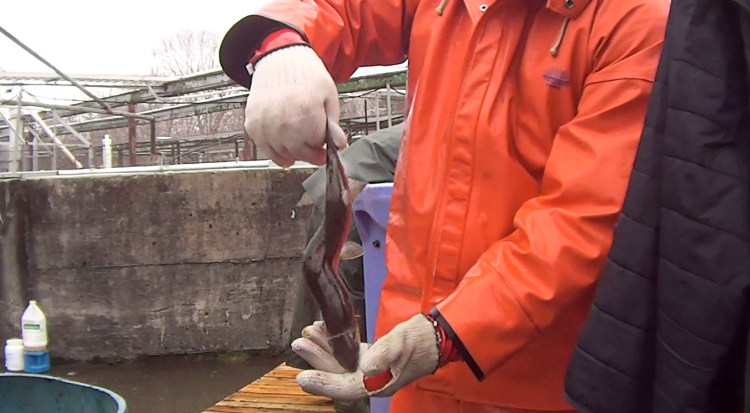The owner of a Bingham aquaculture hatchery has apologized after a nonprofit group’s undercover investigation alleges to have recorded evidence of fish at the facility being improperly treated and killed while being stored in unsanitary conditions.
That has also prompted state animal welfare officials to conduct its own probe of salmon hatchery Cooke Aquaculture.
The nonprofit Washington, D.C.-based Compassion Over Killing released its findings Monday in a news release and nearly 5-minute-long video, based on its undercover investigation earlier this year. The hidden-camera video depicts workers at the hatchery slamming and stomping on fish and conditions the nonprofit group describes as overcrowded and unsanitary, leading to deformities and improper vaccinations.
Nonprofit group officials said they hoped the probe of “industrial fish farming” raised public awareness about the treatment of fish at aquaculture hatcheries and leads to closer oversight. Cooke Aquaculture is a subsidiary of True North Seafood, whose product line is supplied to a number of seafood companies and recently partnered on a brand with food and TV personality Martha Stewart.
“We are only showing the public what really happened; this is what people are eating,” Mike Wolf, director of investigations for Compassion Over Killing, said in a phone interview Monday. “This is one of the most important decisions people are making, and people assume the government is inspecting and making sure the products are healthy.”
Maine’s Animal Welfare Program, which is a division of the Department of Agriculture, Forestry and Conservation, is probing the Bingham facility in the aftermath of the nonprofit group’s findings. Lenny Goodine, a secretary associate, confirmed Monday the agency has an open case with Cooke Aquaculture but declined to answer additional questions about the state inquiry.
In a statement posted online Monday, Glenn Cooke, CEO of the Cooke family of companies, also confirmed the company had been contacted by the Maine Department of Agriculture over an animal welfare complaint “submitted by an activist veganism organization.”
“I am disappointed and deeply saddened by what I saw today,” Cooke said in the statement. “As a family company, we place animal welfare high in our operating standards and endeavor to raise our animals with optimal care and consideration of best practice. What we saw today is most certainly not reflective of these standards.”
Cooke said officials were contacted on Sept. 16 by Maine Department of Agriculture state officials and met with the department at the hatchery the following day. “It appears that unacceptable fish handling incidents have occurred at the Bingham hatchery. These are not our standards and will not continue. The Cooke family has been raising fish for over 35 years and we are not happy about this. We have already begun putting the necessary checks and balances in place to ensure this will not happen again,” Cooke’s statement said. “I am very sorry that this has happened. We are thoroughly reviewing the footage and we are working closely with the Maine Department of Agriculture to review and ensure all our practices are within compliance.”
Cooke said company officials would speak with all of its employees and institute a re-training program at the Maine facility.
Wolf, the director of investigations for the nonprofit animal-rights group, said the hidden-camera footage was recorded at the Bingham facility this past winter and spring over a few months. The footage came from an individual who applied for a job there and worked there, while secretively documenting “the cruelty they’re seeing.”
The Bingham hatchery raises millions of salmon every year distributed for food, hatching thousands of eggs in large metal tanks, according to the group’s video. The video goes on to describe fish suffering from spinal deformities and fungal infections, while fish “deemed no longer profitable are thrown away like trash” and tossed in buckets to “slowly suffocate.” Fish were overcrowded and underfed, and died in “extremely high numbers,” the video said.
“Cause they just suffocate,” says an unidentified worker at the facility, in a short clip during the video. “It’s so rough. Over the years you kinda get desensitized.”
The group said its investigation is intended to also highlight science showing “fish have the capacity to suffer and feel pain.”
“While the aquaculture industry sells itself as a solution to the state of our overfished oceans, there’s a big catch: Millions of farmed fish are languishing inside filthy tanks, and disease and pollution from fish factory farms take a toll on wild populations, too,” Wolf said in a news release with the group’s video. “It’s long past time the fish farming industry is put on the hook for the suffering it’s forcing upon animals.”
Wolf said he didn’t know how many people worked at the facility on a daily basis, but said the group’s investigation should also highlight a lack of training and number of workers handling an enormous amount of fish.
“You’re talking millions of animals here, and there’s so much pressure on workers to get the job done as quickly as possible,” Wolf said. “There are not enough workers and too many fish.”
Copy the Story LinkSend questions/comments to the editors.



Success. Please wait for the page to reload. If the page does not reload within 5 seconds, please refresh the page.
Enter your email and password to access comments.
Hi, to comment on stories you must . This profile is in addition to your subscription and website login.
Already have a commenting profile? .
Invalid username/password.
Please check your email to confirm and complete your registration.
Only subscribers are eligible to post comments. Please subscribe or login first for digital access. Here’s why.
Use the form below to reset your password. When you've submitted your account email, we will send an email with a reset code.